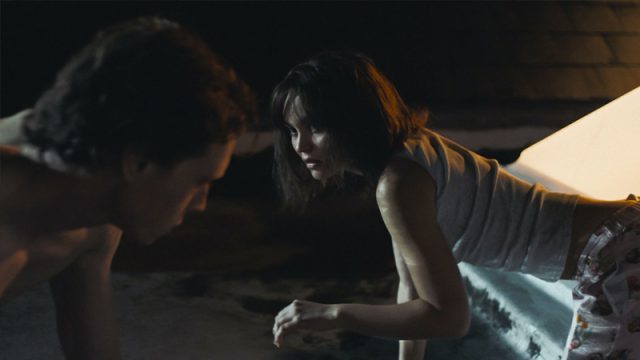ComingSoon recently had an opportunity to speak with Polish composer Stefan Wesolowski about his primal score for Wolf, the critically acclaimed film from writer/director Nathalie Biancheri.
Inspired by the beauty and complexity of nature itself and the desire of staying true to oneself, from the very beginning Stefan wanted his score to express extreme opposites, but also to be integral and coherent at the same time. His goal was to connect these opposing concepts such as untamed wildness with humanistic stability, instinctual fear with organic beauty, and natural order with artificiality by creating the right dynamic and balance between cellos, old synthesizers, flute, contrabass saxophone, and simple digital tools.
RELATED: 37th Annual Film Independent Spirit Awards Nominations Dominated by A24, Netflix, & Neon
Jeff Ames: What led you to become a composer?
Stefan Wesolowski: Partly it was a deep need to create things from nothing, I’ve always had this need. I’m a classically trained violinist and the most exciting part of playing violin was the interpretation. I was playing Bach, Ysaye, Brahms, Lutosławski, just like many others, but for me the best part of playing these works was to find another way of thinking about it, something new, something mine. Interpretation is an art itself, but it’s always just an interpretation, not a creation from nothing. One day, I was like 16 or something, I received a request from my friend who was a priest – he asked me to compose a choral music piece for old Christian poetry and that’s how I composed my first works. It was fascinating and it all started with this.
Who were some of your main musical influences?
In the very beginning it was Gregorian chant, and renaissance choral music, but the more I worked, the more influences I used. I think that my music expression is built on a very different kind of foundation. My sisters were listening to ’60s and ’70s music, and it had a crucial impact on me. My favorite band was The Doors, my favorite song – Golden Brown by The Stranglers. And it was when I was 5 or 6. Still, most important influence for me is classical music. Classical music is like a guardian of quality for me. I must listen to it a lot and feel fulfilled with quality. It makes me resistant to temporary fashions, I hope.
What was it about Wolf that made you want to work on it?
Talks with director Nathalie Biancheri. She told me about her idea, it was very exciting. I would never refuse to work on such a great story, and I’m very happy Nathalie asked me to work on the score.
What was the most challenging aspect of Wolf and how did you overcome that?
I think the most challenging thing was to express my music ideas in the early stages, when we worked on sketches and on unedited film. The soundtrack has to tell the story along with the picture and you want it to be a good piece of music autonomically. When you try many different cues it’s difficult to achieve a continuity of the whole soundtrack. It’s something that comes with time, which you usually don’t have a lot of while working on film.
You stated you wanted to use wanted the score to express extreme opposites, but also to be integral and coherent at the same time. How did you go about achieving this design?
I think it was all about proportions. Between synthesizers and acoustic instruments, melody and atonal noise, restlessness, and beauty.
For Wolf, you utilized cellos, old synthesizers, flute, contrabass saxophone, and simple digital tools. Had you used these instruments in previous scores or did they mark new territory for you?
Acoustic instruments and voices are a natural space for me, especially stringed instruments, but I’ve been working with synthetic tools for some time now and they are becoming more and more understandable for me. But still, it’s a lot to discover and learn.
Do you have any fun, behind-the-scenes stories about the making of Wolf?
I find it quite funny that I made dozens of sketches to try during the editing of the movie, and we ultimately used the first sketches I made.
What were some of the things you learned from Wolf that you’re excited to apply to future endeavors?
I believe it’s always a lot and nothing. You are wiser and more experienced with every new film you work on, and it can definitely help you in new projects. But still, a new film is a blank card, and you are a rookie again and no one can tell where this new journey leads.
What are you most excited for audiences to experience with your score?
Well, I can only hope that it will be a pleasure, maybe a bit disturbing, but still a pleasure. And that it will help people get involved in the film.
Do you have any other projects coming up that you can share with us?
Yes, take your kids and watch the Kayko and Kokosh, a Netflix original animated series. It is something completely different and it gives me a lot of pure, childish joy.










